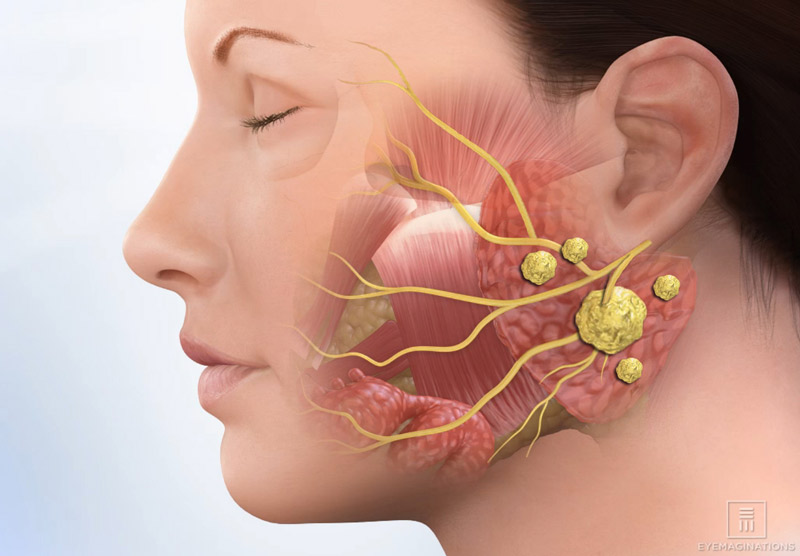Salivary Gland Infections
What’s a salivary gland infection?
A salivary gland infection occurs when a bacterial or viral infection affects your salivary gland or duct. The infection can result from reduced saliva flow, which can be due to a blockage or inflammation of your salivary duct. The condition is called sialadenitis.
Saliva aids digestion, breaks down food, and works to keep your mouth clean. It washes away bacteria and food particles. It also helps control the amount of good and bad bacteria in your mouth. Fewer bacteria and food particles are washed away when saliva doesn’t freely travel throughout your mouth. This may lead to infection.
You have three pairs of large (major) salivary glands. They’re located on each side of your face. Parotid glands, which are the largest, are inside each cheek. They sit above your jaw in front of your ears. When one or more of these glands is infected, it’s called parotitis.
What Causes Salivary Gland Infections?
Blockage or inflammation of the salivary ducts results in sialadenitis, a different term for a salivary gland infection. This blockage can result in reduced saliva flow, which allows bacteria or viruses to thrive, leading to an infection.
Common causes include:
Bacterial Infections
Often caused by Staphylococcus aureus.
Viral Infections
Such as mumps or other viral illnesses.
Salivary Stones
Hardened deposits that block saliva flow.
Dehydration
Reduces saliva production, increasing infection risk.
Autoimmune Conditions
Disorders like Sjögren’s syndrome.
Signs and Symptoms of Salivary Gland Infections
The following signs could indicate a salivary gland infection:
- Swelling or pain in the jaw or neck area.
- Dry mouth or difficulty swallowing.
- Foul-tasting pus or discharge in the mouth.
- Fever and chills in severe cases.
- Redness over the affected gland.
Early diagnosis by a throat specialist is crucial to prevent complications.
Diagnosis and Initial Treatment
When you consult an ENT specialist, they will perform a thorough examination and may recommend imaging tests like ultrasound or CT scans to identify blockages or abscesses.
Common initial treatments include:
Antibiotics
Antibiotics are usually recommended for the treatment of bacterial sialadenitis in order to eradicate the illness.
Hydration
Drinking plenty of fluids helps stimulate saliva production.
Massage and Warm Compresses
To reduce swelling and promote saliva flow.
Medications
Anti-inflammatory medications and pain relievers might be suggested.
When is Sialadenitis Surgery Necessary?
Non-surgical methods might not always be sufficient to eradicate the illness. Surgery may be required to address severe or chronic conditions.
Abscess Drainage
Draining the pus requires a small surgical operation if an abscess has developed.
Salivary Stone Removal
When salivary stones are blocking ducts, they may be removed through minimally invasive surgery.
The afflicted gland may need to be removed completely or partially in cases of severe problems or recurrent infections.
Sialadenitis surgery is generally safe, and an experienced ENT specialist ensures a smooth procedure and recovery.
Recovery and Prevention
Following surgery or therapy, appropriate care is necessary to avoid recurrent infections:
Keep Yourself Hydrated
Stay hydrated to maintain salivation.
Oral Hygiene
Regular brushing and flossing reduces germs.
Avoid Triggers
Reduce intake of acidic or spicy foods that may irritate salivary glands.
Routine Check-ups
Regular visits to your ENT specialist can help monitor gland health.
Why Consult an ENT Specialist for Salivary Gland Infections?
An ENT specialist or throat specialist is trained to diagnose and manage complex salivary gland conditions. To guarantee a precise diagnosis and successful treatment, they employ cutting-edge instruments and methods. Whether you need bacterial sialadenitis treatment, minimally invasive procedures, or advice on preventing future issues, an ENT doctor can provide comprehensive care.
Expert Salivary Gland Care in Nashik
If you’re experiencing symptoms of a salivary gland infection, it’s time to consult a specialist. Dr. Sudarshen Aahire, an experienced ENT and throat specialist in Nashik, offers personalized care for sialadenitis and related conditions. Dr. Aahire guarantees that you will get the finest result possible because of his competence in both medicinal and surgical procedures.
Don’t ignore persistent pain or swelling in your salivary glands. Schedule an appointment today for expert evaluation and care.

